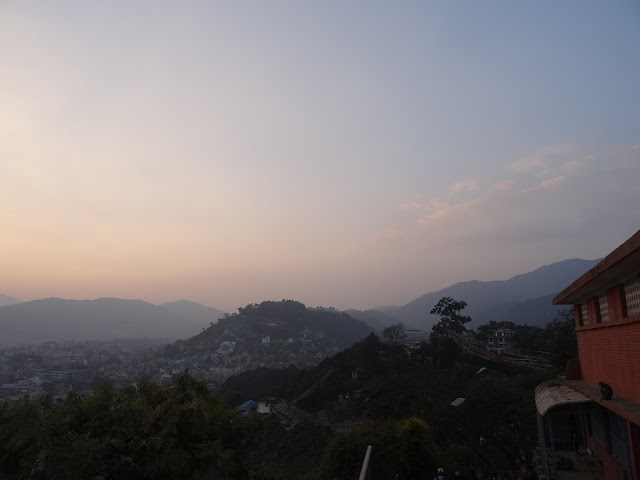As soon as we crossed the border from Gorakhpur in India (where we stayed in the worst hotel probably of the whole sub-continent) to Lumbini in Nepal, there was less traffic, the cars weren't honking constantly, there were less hawkers in the streets, and it was just generally cleaner. Maybe it is the influence of Buddhism, because as the writing on many buses told us "Buddha was born in Nepal!", but we definitely enjoyed a few calmer days to unwind and literally catch our breath. I think Pokhara was the first place on our entire trip where I could breathe properly and where my bronchitis finally cleared up. Having said that, Kathmandu is definitely an exception and rivals Delhi in terms of air pollution.
After enjoying a few of days of sun, western food, and lazing about in a lovely guest house in Pokhara we became active again and did a couple of day hikes in order to catch some good mountain views. It was actually cloudy most of the time and when we hiked to the Peace Pagoda on the other side of the lake we didn't see much of the Annapurna range. But the next day we woke up to perfectly clear sky so we decided to go to Sarangkot, another village near Pokhara, even before breakfast and - bingo! We had the perfect views and the perfect weather and got to enjoy the best breakfast ever on a terrace with the Himalaya as a backdrop.
Nepal turns out to be a great country for western backpackers: food and accommodation are dirt cheap (dinner for two for 7 - 8 €, a double room in a decent guest house for 9 €/night), people are friendly and laid-back, nature is beautiful, and the general traveler infrastructure is excellent. Although I should mention that the transport is an exception there: a 10 hour bus ride to cover less than 200 km is unfortunately normal. But in contrast to India, where you had to book the trains 3 months in advance, there are plenty of buses you can take and stay flexible.
While India was more of an adventure and you never know what you would see when you turned the next corner, Nepal was amazingly easy to navigate and required very little planning and organizing. I was surprised how different the two countries are, despite also having many things in common. I should maybe also add that we didn't do any serious trekking, which probably is more complicated to do since you need a guide, a license, etc. but it seemed like you could do all that while you were there. Also, we were slightly off-season (main trekking season is October-November I think) so again it might have been more quiet.
It's also funny to see what kind of tourists visit Nepal. After a while you recognize the different "categories" very easily: the serious hikers that come mainly for that purpose and wear their trekking outfits even in nice restaurants, the "hippies" that are mainly interested in the spiritual journey (and smoking weed), and finally the last category that we fall in, which is culture tourists and families with kids who come to visit temples and do some leisurely day hikes. All in all a very nice and pleasant mixture!
Of course, after almost a month you start missing home a bit, even on the most amazing trip. Therefore I was sad to leave but also looking forward to the little things that we take for granted in our everyday lives, like a hot shower, clean streets (well, relatively in Molenbeek), being able to drink the tap water, a soft mattress, heating, or electricity 24/7.
It also made me realize once again how privileged we are to live in such an equal society (again, relatively) where women can go out by themselves and wear the clothes they like, marry whom they want, and simply not being killed for being a girl or a woman - sex-selective abortion is still a thing in case you have forgotten. Also, social security. Especially seeing a lot of homeless families with small children, old people, and persons with disabilities who were begging in the streets were shocking for me to see. It was less in Nepal than in India but still, it is very much "in your face".
Fact is, that if your family cannot take care of you, there is no safety net. I read an interesting article in a local newspaper which showed perfectly how all of these problems are also linked together: It was about a family in a rural area, in which six people were blind and they were obviously very poor and couldn't access basic services. But the reason there were so many blind people in the family leaving basically only one of family members who was sighted to be the sole bread winner was not a hereditary disease or anything like that, it was because of the caste system which forced a blind man to marry another blind or disabled woman! I think this says so much about why those problems like poverty, inequality, and poor health persist.
All of this is true for both India and Nepal, actually for many places in the world. I knew it before in theory, but seeing it is a different thing. Still, I enjoyed our trip and loved Nepal with all its beauty and the kindness of the people, it was the perfect antidote to India's craziness and made for a nice end of our trip.
*************************************************************************
While we were traveling in Nepal, a good friend of my sisters' who was there at the same time, died in a tragic hiking accident. This did not affect our trip directly but we were of course still very shaken up by those events. Therefore, I would like to dedicate this post to her and her family. My thoughts are with them.



































No comments:
Post a Comment